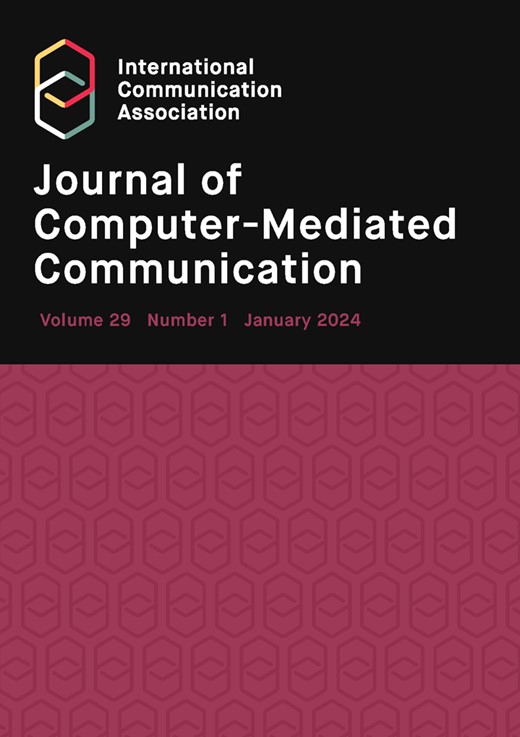排斥/拒绝会影响自我披露吗?研究社会威胁后感知到的社会负担能力的吸引力
IF 5.7
1区 文学
Q1 COMMUNICATION
引用次数: 0
摘要
两项研究探讨了社会需求威胁(排斥和拒绝)如何影响人们随后对各种数字受众的自我披露偏好。研究结果考虑了需求威胁等背景/情境因素如何影响媒体的两个既定感知社交功能的吸引力:个性化和隐私/可见性。参与者参加了一项(虚假的)社交媒体活动,以激发包容/排斥/拒绝的感觉,然后被问及如何与不同的潜在受众分享自己的媒体偏好。结果显示,社交需求威胁对隐私偏好没有显著影响,但对与某些受众分享的偏好有影响,而对与其他受众分享的偏好没有影响。值得注意的是,被排斥和被拒绝的参与者表现出不同的偏好模式,这表明这些形式的社交需求威胁可能会对未来的自我披露产生不同的影响。讨论中还考虑了在线关系发展和社区建设的影响。本文章由计算机程序翻译,如有差异,请以英文原文为准。
Does ostracism/rejection impact self-disclosures? Examining the appeal of perceived social affordances after social threat
Two studies examine how experiencing a social need threat (ostracism and rejection) impacts subsequent preferences for self-disclosure to various digital audiences. Findings consider how contextual/situational factors like need threats may impact the appeal of two established perceived social affordances of media: personalization and privacy/visibility. Participants took part in a (bogus) social media activity to elicit feelings of inclusion/ostracization/rejection and then were asked about sharing their media preferences with various potential audiences. Results show that social need threats have no significant impact on privacy preferences but do affect preferences for sharing with some audiences and not others. Notably, ostracized and rejected participants show different patterns of preferences, suggesting these forms of social need threat may have distinct impacts on future self-disclosures. Implications for online relationship development and community building are considered in the discussion.
求助全文
通过发布文献求助,成功后即可免费获取论文全文。
去求助
来源期刊
CiteScore
9.60
自引率
2.80%
发文量
26
期刊介绍:
The Journal of Computer-Mediated Communication (JCMC) has been a longstanding contributor to the field of computer-mediated communication research. Since its inception in 1995, it has been a pioneer in web-based, peer-reviewed scholarly publications. JCMC encourages interdisciplinary research, welcoming contributions from various disciplines, such as communication, business, education, political science, sociology, psychology, media studies, and information science. The journal's commitment to open access and high-quality standards has solidified its status as a reputable source for scholars exploring the dynamics of communication in the digital age.

 求助内容:
求助内容: 应助结果提醒方式:
应助结果提醒方式:


